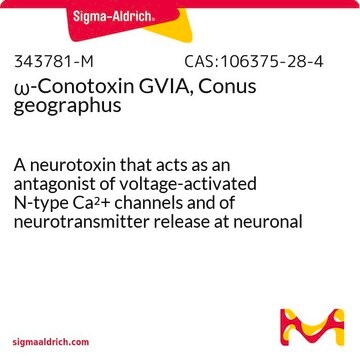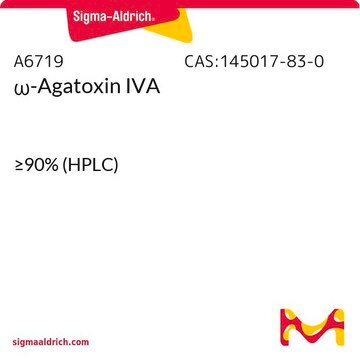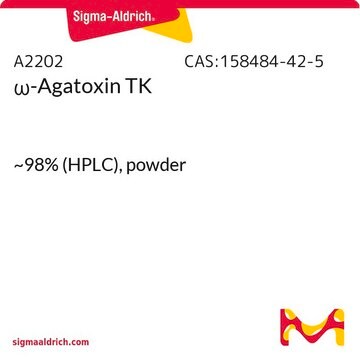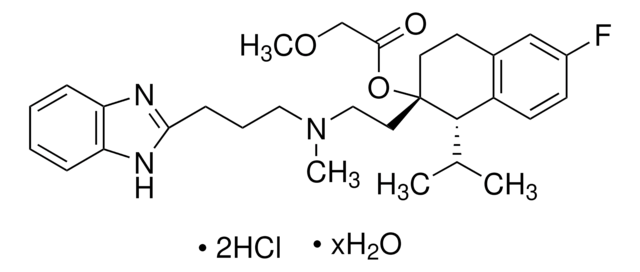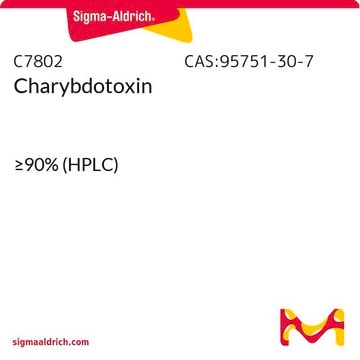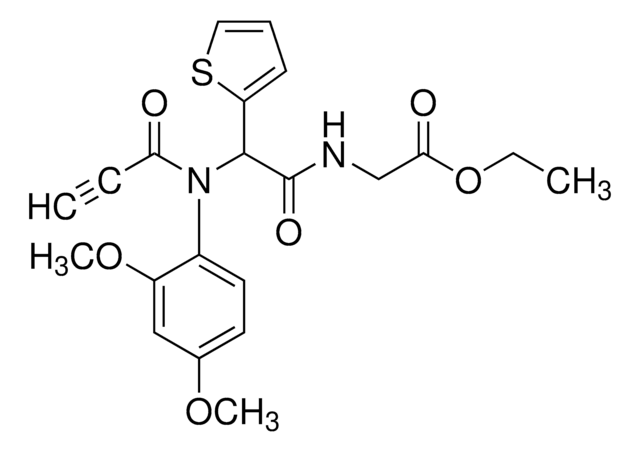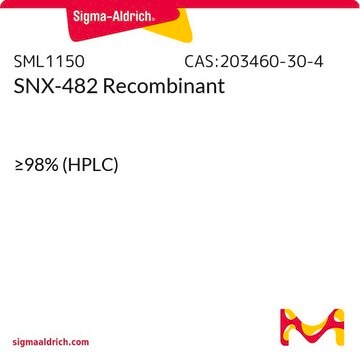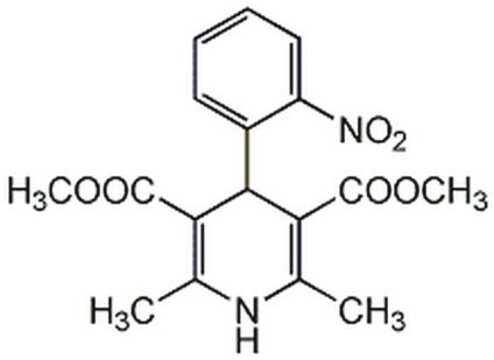All Photos(1)
About This Item
Empirical Formula (Hill Notation):
C120H182N38O43S6
CAS Number:
Molecular Weight:
3037.35
MDL number:
UNSPSC Code:
12352202
NACRES:
NA.32
Recommended Products
Quality Level
Assay
≥97% (HPLC)
form
powder
composition
Peptide content, ~70%
storage temp.
−20°C
Gene Information
human ... CACNA1B(774)
mouse ... CACNA1B(12287)
rat ... CACNA1B(257648)
Looking for similar products? Visit Product Comparison Guide
Amino Acid Sequence
Cys-Lys-Ser-Hyp-Gly-Ser-Ser-Cys-Ser-Hyp-Thr-Ser-Tyr-Asn-Cys-Cys-Arg-Ser-Cys-Asn-Hyp-Tyr-Thr-Lys-Arg-Cys-Tyr-NH2 [Disulfide Bridges: 1-16, 8-19, 15-26]
Application
ω-Conotoxin GVIA has been used as an antagonist for N-type calcium channel (CaV2.2) in various studies.
Powerful probe for exploring the vertebrate pre-synaptic terminal.
Biochem/physiol Actions
ω-Conotoxin GVIA is a 27 amino acid neurotoxin containing three disulfide bonds. It inhibits central neurotransmitter release and also exhibits antihypertensive, analgesic and neuroprotective activities.
Blocks specific voltage-dependent N-type Ca2+ channels in neurons, but not in muscle; does not bind to either the dihydropyridine or verapamil binding sites; peptide first isolated from the marine snail Conus geographus L.
Other Notes
Lyophilized from 0.1% TFA in H2O
Storage Class Code
11 - Combustible Solids
WGK
WGK 3
Flash Point(F)
Not applicable
Flash Point(C)
Not applicable
Personal Protective Equipment
dust mask type N95 (US), Eyeshields, Gloves
Choose from one of the most recent versions:
Certificates of Analysis (COA)
Lot/Batch Number
Don't see the Right Version?
If you require a particular version, you can look up a specific certificate by the Lot or Batch number.
Already Own This Product?
Find documentation for the products that you have recently purchased in the Document Library.
Structure-function relationships of $\omega$-conotoxin GVIA Synthesis, structure, calcium channel binding, and functional assay of alanine-substituted analogues
Lew MJ, et al.
The Journal of Biological Chemistry, 272(18), 12014-12023 (1997)
Precursor structure of omega-conotoxin GVIA determined from a cDNA clone
Colledge CJ, et al.
Toxicon, 30(9), 1111-1116 (1992)
C J Herrero et al.
British journal of pharmacology, 127(6), 1375-1387 (1999-08-24)
Rat alpha3beta4 or alpha7 neuronal nicotinic acetylcholine receptors (AChRs) were expressed in Xenopus laevis oocytes, and the effects of various toxins and non-toxin Ca2+ channel blockers studied. Nicotinic AChR currents were elicited by 1 s pulses of dimethylphenylpiperazinium (DMPP, 100
Crotoxin from Crotalus durissus terrificus snake venom induces the release of glutamate from cerebrocortical synaptosomes via N and P/Q calcium channels
da Silva Lomeo R, et al.
Toxicon, 85(1), 5-16 (2014)
CaV2. 2 gates calcium-independent but voltage-dependent secretion in mammalian sensory neurons
Chai Z, et al.
Neuron, 96(6), 1317-1326 (2017)
Our team of scientists has experience in all areas of research including Life Science, Material Science, Chemical Synthesis, Chromatography, Analytical and many others.
Contact Technical Service